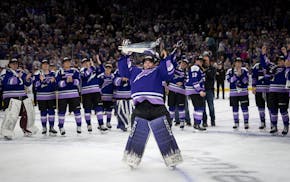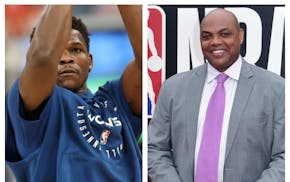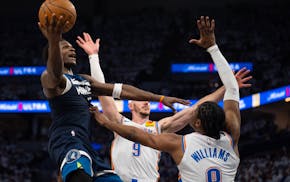SAN FRANCISCO – Two seasons ago, after Rudy Gobert took a swing at Kyle Anderson in a timeout huddle on the last day of the regular season, Anderson said he and Gobert called each other that night and made amends. Their relationship was fine, and they left the conversation in a good place.
There was one thing they had to do, though: communicate that to the rest of the team.
They didn't want things to be awkward when they arrived at the facility the next day, so instead of waiting to tell everyone in person that all was well, Anderson said Gobert sent a message to the team group chat.
"That's just the times we live in where Rudy is able to get the message across before there's tension the next day," Anderson told the Minnesota Star Tribune recently when his current team, the Warriors, faced the Timberwolves. "... We spoke, we hashed it out, and it does make the next day a lot lighter, not as much tension. No one is angry. We say what's up to each other. We focus on the next thing."
Flash forward to this season, when the Wolves lost their composure in a loss at Toronto. Gobert, upset when Julius Randle didn't give him the ball late in the game, drew a three-second call and a foul at the other end. That moment sparked a lot of conversation in person after the game and in the days ahead as the Wolves lost four straight games.
The term "players-only meeting" tends to attract a lot of media attention when teams have them, but there's something else that is "players-only" that facilitates communication and team bonding in a similar way to in-person meetings: the players-only text group chat.
They have become a part of life in the NBA, and the Wolves' chat played a role in how they dug themselves out of an early-season hole.
"That's essentially our safe space," guard Donte DiVincenzo said. "Everybody knows whatever you say in there stays in there. More so like 90% of the time you're joking around, messing around, sending funny stuff back and forth, picking on each other. Then when [stuff] hits the fan, that's where most guys feel comfortable being able to express what they're thinking."
Taking ownership
After a recent Wolves practice in Golden State, DiVincenzo spoke for several minutes about the function a group chat can serve in a team's dynamics, as if the subject struck a chord with him. He said the group chat can be a way for teams to communicate without the heat of a moment clouding judgment, that "sometimes the worst time to talk about things is right after it happened, and I think that's what the group chat allows us to do."
Knowing they have the group chat to turn to, players can take time from each other and carry on the necessary conversations there when the time is right and feelings have subsided.
"You sit in a room, have a team meeting, and 90% of the time what you're thinking when you're in front of 15 other men, you don't know how to express yourself necessarily," DiVincenzo said. "It's just human nature. But there's this perception that everybody's this hard-nosed NBA player, tough and want to fight. Everybody is still a human being and they have feelings and they see things a different way.
"When it comes to group chat and texting, it's easier to express it. From the receiving end … you get to sit there and read it. It's not a reaction thing."
After the Wolves lost to Sacramento on Nov. 27, Anthony Edwards lamented the team wasn't communicating as well as it should. The group chat has been a place where that communication has taken place.
"Just this past instance, we were going through a stretch to find a way to dig out a win, so there was just a lot of communication on how to motivate each other," Naz Reid said.
Added Mike Conley: "It's a good way to kind of get a PSA out there that everybody can comment on, give their two cents."
DiVincenzo said there was a lot of "ownership" taking place in the team's group chat for what certain players felt they needed to do better. The team could all see it. Then, when they'd meet with coach Chris Finch, they could compare what the player said to what Finch said and see if everyone was on the same page.
"If I put in the group chat I need to do X, Y, Z better and I go into a team meeting the next day and Finchy says X, Y, Z in a complete opposite way, everybody's looking at it like, wait, Donte's mindset is not on the same thing as the coach, the group, everything," DiVincenzo said. "But for us, it was accurate. Everybody watched the film, looked themselves in the mirror and … we're good right now, we're rolling right now and [we've got to be] able to address [issues] while we're rolling."
Memes, memes, memes
Of course, the group chat isn't all for serious takes. Players will message it if they're looking for dinner companions on the road, and there are social media clips, and jokes every day.
Conley said there are also subgroup chats that revolve around player interests — for instance, those who like to play "Call of Duty," those who like to golf — and the many group chats cause him a headache.
"Most of the time I put my phone on dnd [do not disturb] because it'll be like 1,000 messages a day," Conley said. "I'll mute it if I can."
Reid said in his six seasons, the most active team group chat he had was last season. Why?
"Because of KAT [Karl-Anthony Towns]," Reid said. "Memes, memes, memes."
Towns tended to send a bunch of memes to the team's group chat to keep it lighthearted and loose.
"KAT was big on engaging," Nickeil Alexander-Walker said. "One thing about Karl, he's a super people person. So, it's not hard to connect with guys like KAT."
Anderson said he'd get mad if the rookies didn't let the group chat know that police were on the highway after the Wolves got back from a road trip and were driving home from the airport.
"I'd be pretty [ticked] we didn't let everybody know that the cops are there waiting on us so we don't speed," Anderson said.
And in Wolves group chats, there's always a new number that tends to show up from time to time — Edwards. Edwards frequently changes his phone number, and it's hard for his teammates to keep up. Anderson wasn't sure if he had Edwards' current number. What about Reid, who's been his teammate since he came into the league?
"I got like five numbers or something for him," he said. "I don't know who to text."
Awkward goodbyes
There is one facet of the team group text that can be a bit awkward: saying goodbye. When players get traded or move to other teams, how do they handle their inevitable exit from the team group chat? For Alexander-Walker, there were no goodbyes when the Jazz traded him to Minnesota. He just dipped out of that chat.
"I didn't build any connections strong enough to warrant a whole deep message," he said. "My role wasn't that intuitive on the team."
Anderson also said he's not the sentimental type. When he left for Golden State, he just left the Wolves chat and deleted it from his phone, like he has with all other group chats in his career. That's not to say he was distant from his teammates in Minnesota. He was just moving on.
"They gotta go," he said. "Putting the energy toward my next team. Delete. Gotta go."
Players can't stay in the team group chats if they're not there anymore. That's because for moments like what the Wolves went through, there has to be a place for just the team to communicate without the dialogue getting out in public. In that way, players can hold each other accountable if they leak things from the group chat. Nobody can overhear their conversations. But that's usually not a concern in the chats DiVincenzo has been a part of in his career.
"There's a code, an understanding: Let's air this out together, let's keep it in house, move forward, and I think that's a beautiful thing," DiVincenzo said.
It's how the Wolves, who have won four of five entering Friday night's game against the Lakers, have overcome some early adversity in their season. Memes and jokes, with a little candor and truth mixed in.
"That allows everybody to feel a sense of comfort around each other," Conley said.
Lakers at Wolves
7 p.m. Friday at Target Center
TV; radio: FanDuel Sports Network; KFAN (100.3-FM), iHeart app
Wolves preview: The Wolves have won four of their past five games and are coming off a four-day break. Their defense ranked fifth in efficiency entering Thursday. Before the past five games, it ranked 12th. Their offensive efficiency ranks 17th. Rob Dillingham, who has missed the last four games because of a sprained ankle, practiced fully in five-on-five scrimmages this week.
Lakers preview: LeBron James will not play. James was absent this week from Lakers practice for personal reasons, and Thursday the team announced he would be held out because of a sore left foot. This will be the third meeting between the Lakers and Wolves this season with the teams splitting the first two matchups, the home team winning each. The Lakers are 3-7 in their past 10 games and enter Friday with the 14th-rated offense and 26th-ranked defense.

Minnesota Frost to celebrate second Walter Cup with downtown St. Paul parade and party

RandBall: The 10 things you need to know today in Minnesota sports

Charles Barkley: 'Don't try to make Anthony Edwards the face of the NBA'

How, where to watch Wolves-Thunder in Western Conference finals

